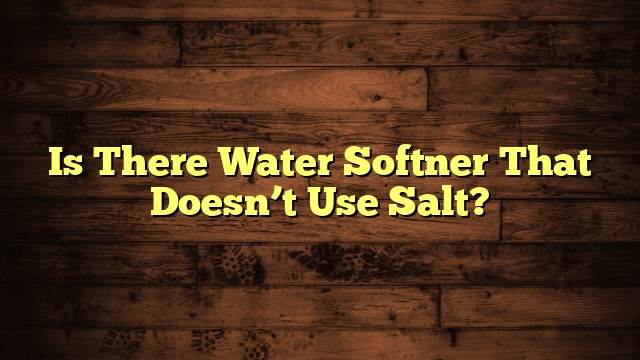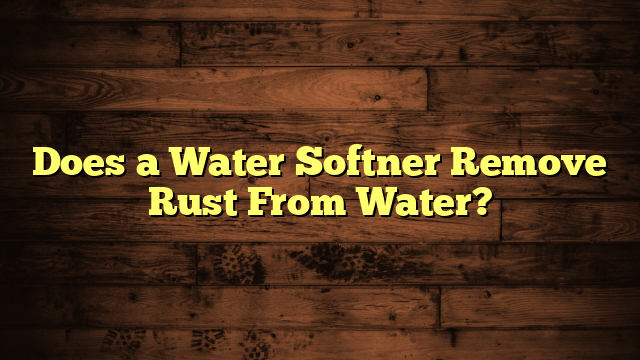Is There Water Softner That Doesn’t Use Salt?
Yes, there are water softeners that don't use salt, offering effective solutions for handling hard water without stripping essential minerals. These salt-free systems work by altering the properties of minerals, preventing buildup in your plumbing and appliances. Technologies like Template Assisted Crystallization (TAC) and magnetic systems are common options. They have advantages, such as lower maintenance needs and eco-friendliness, without the extra sodium. Plus, they can improve your water's taste and efficiency. Understanding which type suits your needs can help you make the best choice. If you're curious about specifics, there's much more to uncover about these alternatives.
Key Takeaways
- Yes, salt-free water softeners manage hard water without removing minerals, using technologies like Template Assisted Crystallization (TAC) and electromagnetic systems.
- These systems prevent scale buildup by altering the properties of hard minerals, making them non-adhering.
- Salt-free softeners do not require salt or brine tank maintenance, making them a low-maintenance option.
- They can improve the taste and odor of water without introducing excess sodium, benefiting health and ecosystems.
- Long-term costs may be lower due to reduced plumbing repairs and increased appliance efficiency.
Understanding Hard Water
Understanding hard water starts with recognizing its mineral content, primarily calcium and magnesium. When these minerals dissolve into your water supply, they contribute to what's known as water hardness.
You may not notice it at first, but over time, you might see signs of mineral buildup in your appliances, plumbing, and even your skin and hair after washing.
Hard water can create a range of challenges in your daily life. For one, it can reduce the effectiveness of soaps and detergents, leaving you with a less-than-satisfying clean.
You may also find that your laundry feels stiff, and your dishes sport unsightly spots after washing.
Additionally, mineral buildup can lead to clogs in pipes and decreased efficiency in water heaters, which can increase your energy bills.
Understanding the implications of water hardness helps you make informed decisions about managing it.
What Is a Salt-Free Water Softener?
A salt-free water softener offers an alternative solution for managing hard water by using a different approach than traditional salt-based systems. Instead of removing minerals like calcium and magnesium, these systems alter their properties, making them less likely to cause buildup in pipes and appliances. This means you can enjoy improved water quality without the need for salt.
Salt-free alternatives often employ technologies like template-assisted crystallization or magnetic fields. These methods prevent hard minerals from adhering to surfaces, which can help maintain the efficiency of your plumbing and appliances. Since these systems don't use salt, you won't have to worry about the potential environmental impact or the health concerns associated with high sodium intake.
Moreover, salt-free water softeners require less maintenance compared to their salt-based counterparts. You won't need to constantly refill salt or deal with the brine discharge that can be problematic in some areas.
Types of Salt-Free Water Softeners
When it comes to salt-free water softeners, you'll find several types designed to tackle hard water issues effectively. One popular option is the Template Assisted Crystallization (TAC) system. This method transforms hard minerals into a form that doesn't stick to surfaces, thereby reducing scale buildup.
Another choice is the Electromagnetic Water Conditioner, which uses magnetic fields to change the structure of minerals, preventing them from adhering to pipes and appliances.
If you're looking for salt-free alternatives, you'll also find the Magnetic Water Softener, which claims to alter the behavior of hard water through magnets. While these systems are easier to maintain than traditional salt-based softeners, you should still consider maintenance considerations, such as regular inspections to guarantee they're functioning properly.
While each type has its benefits, it's crucial to evaluate your specific hard water problems and choose the right system for your needs.
How Salt-Free Systems Work
Salt-free water softening systems operate by using innovative technologies to change how hard minerals behave in your water supply. Unlike traditional salt-based systems, these systems don't remove calcium and magnesium; instead, they employ salt-free technology to alter their structure.
This process, often referred to as mineral replacement, transforms hard minerals into smaller particles that remain suspended in water.
When you install a salt-free system, you'll notice that it doesn't require the addition of salt or the need for regular maintenance associated with brine tanks. Instead, these systems utilize various methods, such as Template Assisted Crystallization (TAC) or Electromagnetic waves, to modify the minerals.
With TAC, for instance, the hard minerals crystallize into a form that doesn't stick to surfaces, preventing scale buildup in your pipes and appliances.
With these innovative approaches, you'll enjoy the benefits of softened water without the drawbacks of salt, like the potential for increased sodium levels in your water supply.
Salt-free systems offer an eco-friendly alternative that addresses hard water issues while keeping your home's plumbing and appliances in top shape.
Benefits of Salt-Free Solutions
One of the standout advantages of salt-free water softening solutions is their ability to protect your plumbing and appliances without the downsides of sodium.
Unlike traditional salt-based systems, these innovative solutions prevent scale buildup without introducing excess sodium into your water supply. This means your pipes stay clear, and your appliances run more efficiently, potentially extending their lifespan.
Another significant benefit lies in the environmental impact. By opting for a salt-free system, you reduce the amount of salt that can contribute to waterway pollution and harm aquatic ecosystems.
This choice not only supports local wildlife but also promotes cleaner water for everyone.
Health benefits are equally compelling. With less sodium in your water, you can enjoy better hydration and a reduced risk of high blood pressure or other related health issues.
Plus, your skin and hair can feel softer and healthier, free from the drying effects of hard water.
Limitations of Non-Salt Softeners
While non-salt softeners offer several advantages, they also come with limitations that you should consider. One major concern is their efficiency. Unlike traditional salt-based systems, non-salt softeners don't remove hardness minerals but merely alter them, which can lead to issues with scale buildup in your pipes and appliances. This means you might still face some hardness-related problems, especially in areas with extremely hard water.
Another limitation of salt-free systems is their effectiveness in very hard water conditions. If your water hardness exceeds a certain level, these systems may not perform well, leading to dissatisfaction.
Furthermore, you might notice that some non-salt softeners require regular maintenance or replacement of media, which can add to your overall costs.
Moreover, you might find that the taste of water softened by these systems isn't as pleasant as that from salt-based softeners. This can be a deal-breaker if you're particular about your drinking water.
Comparing Costs and Effectiveness
When you're weighing your options for water softeners, it's essential to evaluate both costs and effectiveness. A cost comparison between traditional salt-based systems and non-salt alternatives reveals significant differences.
While traditional systems often have lower upfront costs, they require ongoing expenses for salt and maintenance, which can add up over time. Non-salt systems, like salt-free water conditioners, might've higher initial prices but often save you money in the long run due to lower operational costs.
In terms of effectiveness analysis, you'll find that salt-based systems excel at removing hard minerals, while non-salt options work differently. They prevent scale buildup rather than eliminating hardness from water.
This means that, depending on your water quality and usage, non-salt systems can still provide satisfactory results, especially in areas with moderate hardness.
Ultimately, consider your water's specific hardness level and your budget. By balancing cost and effectiveness, you can make a more informed decision that suits your household's needs.
Don't forget to factor in the long-term savings and performance when making your choice!
Making the Right Choice for Your Home
Choosing the right water softener for your home depends on various factors, including your specific water hardness, budget, and lifestyle. You want to guarantee that the solution you choose will effectively improve your water quality without negatively impacting your household appliances or increasing your maintenance efforts.
When making your decision, consider the following:
- Water Hardness Level: Test your water to know how hard it is; this will guide you in selecting the right system.
- Budget: Factor in both initial costs and long-term expenses, like maintenance and replacement filters.
- Lifestyle Needs: Think about your family's routine and how much softened water you actually need.
With these points in mind, you can choose a salt-free water softener that fits perfectly into your home.
Remember, a good system won't only enhance your water quality but also prolong the life of your appliances, saving you money in the long run.
Frequently Asked Questions
Can Salt-Free Water Softeners Remove Existing Hard Water Deposits?
Salt-free water softeners don't directly remove existing hard water deposits or mineral buildup. Instead, they help prevent future accumulation by altering the minerals, keeping your plumbing and appliances healthier over time.
Do Salt-Free Systems Require Electricity to Operate?
Salt-free systems typically don't require electricity for operation, promoting energy efficiency and low electricity consumption. They use natural processes, ensuring you enjoy operational efficiency without added energy costs, making them a practical choice for many households.
How Long Do Salt-Free Water Softeners Last?
Salt-free water softeners generally last around 5 to 10 years. Their longevity depends on factors like water quality and usage. Regular maintenance, such as cleaning the unit, can enhance their lifespan and performance.
Are Salt-Free Water Softeners Environmentally Friendly?
Did you know that salt-free water softeners reduce sodium discharge by up to 80%? Their eco-friendly benefits make them sustainable alternatives, helping you conserve water and protect the environment while maintaining effective water treatment.
Can I Use a Salt-Free System With Well Water?
You can use a salt-free system with well water, but consider your well water characteristics. Salt-free alternatives may not remove hardness effectively, so make certain the system suits the specific mineral content of your well water.
Conclusion
So, if you're tired of lugging around bags of salt like it's some sort of Olympic sport, a salt-free water softener might just be your new best friend. While these systems won't turn your hard water into liquid gold, they can help reduce scale buildup and keep your plumbing happy. Just remember, they won't work miracles, but they'll make your life a bit easier. So, choose wisely, and let the water flow smoothly—without the salt!







